SURYA takes no shortcuts. To reach their audience they use many methods but one: vocals. No, you will not find lyrics in SURYA, at least on their latest release “Apocalypse A.D.” Yet, they are challenging you with animal, earth and human liberation message. I talked with band members, Bartek and Greg on guitars and Raquel on drums about their apocalyptic music, positive message it carries and today’s world we live in.
Note: the interview also appeared in a Polish fanzine called CHAOS W MOJEJ GŁOWIE. Here, is the English version.
SURYA means Sun. But your music is heavy and dark. Is it darkness that drives you, or hope for a better future?
Bartek: Yes, SURYA means Sun or Sun god in indian mythology. To me it symbolises life source, nature’s purest form of energy as well as knowledge, wisdom and hope. We are encompassed by forces of darkness and ignorance but it’s the hope (or even its sparks) which keeps me going, keeps me striving to be a better person and to see a real change in this fucked up world – someday maybe…
Greg: I’d say that SURYA’s music merely holds up a mirror the world, we’re just reflecting darkness back at the listener, opening them up to the world of suffering. It’s easy to be driven by darkness and pessimism but we want to be proven wrong in that, we want people to imagine a brighter post-capitalist future.
As friends, lovers, comrades, we’re are all capable of creating spaces, opening cracks within this society to enjoy life and to explore our full human potential. That’s what DIY music is all about; about an attempt at creating an outside. It helps us to overcome the emotional and spiritual emptiness that this world creates and shows that alternatives can be possible. But it’s becoming increasingly difficult to engage in any kind of radical cultural production. Especially in a place like London – where even the basics of life are so inaccessible and where capitalism has colonised almost every available space.
We shouldn’t forget that our generation and the next face some serious challenges, the world has never seemed more fucked in my lifetime.
Right wing populism and a renewed fascist self-confidence is sweeping the world; the death-spiral of austerity goes on; more and more wealth is concentrated in the hands of a tiny few; global warming continues on its march towards an irreversible tipping point; Syria is reduced to all but rubble; refugees drown in the Mediterranean Sea and the English channel; worker’s rights are eroded; organised labour has fallen apart; mass incarceration destroys lives, families and communities; fracking threatens our water supplies; indigenous nations are suppressed and dominated; the old growth forests are disappearing and animals continue to be tortured for profit and greed. And, for the first time in a generation, nuclear war seems a tangible possibility.
I could go on and on with more examples. Capitalism, an economic and social system that has only existed for a few short centuries has presented us with only darkness. If we don’t replace it then short-termism for the profits of a few will soon be the death of us all.
Whether we seek to right these injustices and build a brighter more positive future, based on the commons and respect for nature; or stand back and watch the world burn is our choice.
After the last human has shuffled off this mortal coil, the earth will still be here, and so will nature – or what’s left of it. Nature thrives when humans are removed from the picture. If you want to see what a fleeting speck we are in the history of this earth, and just how soon we will be forgotten, look at Chernobyl. Since the area was rendered unlivable to human beings in 1986, nature has quickly reclaimed it. Wolves, elk, boar, bear, lynxes, deer, and dozens of other species are thriving inside the area evacuated after the disaster. The forest has eclipsed the concrete. So, the real choice facing us is actually whether we want to save ourselves and the only way to save the earth and ourselves is through total liberation.
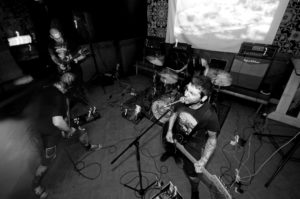
OK Greg, but how do we achieve it on a global scale when we are different nations, driven by different forces of evil? Or perhaps, there is one very same force of evil? Power?
Greg: We achieve it through struggle, through organising in our workplaces (if anyone reading this isn’t a member of a trades union – join one now!) and through international solidarity. What is evil? I’m not interested in moralism I’m interested in equality. It’s good that you mention power. We have to start and end our analysis with power, which at the moment is certainly not in our hands. Power is exactly how we achieve a post-capitalist society. Power is what we want to win; power for working class people internationally. The developments of the information-economy in late capitalism are already providing us with the building blocks of a future internationally networked movement. Capitalism has created millions upon millions of networked people, all exploited, all having their labour time stolen from them and they have never been so well educated. We have the entirety of human knowledge and intelligence just one click away on our smart phones and computers. Knowledge and information is key to the future. States can try and shut down these networks in times of crisis but once the genie is out of the bottle you can’t put it back in.
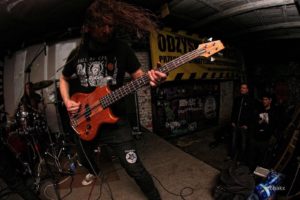
I read an interesting article in the Guardian the other day, which basically said that famine can only be avoided if the rich give up meat, fish and dairy and we have to act now or in ten years time we will be faced with one choice only: feed ourselves or feed the animals. We won’t be able to do both as we are doing now. Now, vegetarianism and veganism gains more and more recognition within the mainstream. Good or bad? Is it through the ugly and corrupted mainstream that we all become vegans one day?
Bartek: Every way of promoting veganism is important- this is not about us and our good feelings about ourselves- this is about saving this beautiful planet and animals which don’t have to suffer because of our immature lust for taste. I think- and this is actually not my opinion but cold fact- we have to really wake up or we simply won’t survive. The reason why i emphasize the importance of veganism and not vegetarianism is because we have to face the facts: vegetarianism is far from being sustainable and it’s definitely not animal-friendly. It’s right time to see what is really happening in dairy farms and realise that what animals go through their miserable lives can be summed up in one word: torture. Let that really sink in. So answering your question- as long as media expose the truth and promote better, healthier and more compassionate lifestyle i don’t really see any problem- whether it’s “mainstream” or “independent” source of information.
Greg: As Bartek says there really isn’t a choice in these matters. Even the UN has recognised for over a decade that a global move towards a vegan diet is necessary for the survival of humanity and the Earth. Animal agriculture is a key contributor to climate change, water pollution and water use, and pasture expansion for farm animals is a key driver of deforestation. It has to stop.
The music you compose is gloomy, some might say even depressive. Yet, you want to make people think when they approach your music. You want them to take action and try to make a change…
Greg: I think that the music is more of a meditation on the world around us. Hopefully the listener can also stop to think and consider the part that they might have to play in changing the world for the better. Or they can just enjoy the music; there’s nothing wrong with that. But of course we hope the listener takes something more than merely enjoyment away from the experience.
Bartek: Exactly, as Greg said before it is hard to not to see all the darkness around us, but to me it is equally important to do our best to maintain positive and constructive approach/attitude. The hope and imagination plays important role in this- our culture is literally soaked in a sea of hopelessness, escapism and defeatism so for most it is more and more impossible to imagine that real change is possible- it is not easy task- it’s very hard work but still not impossible. It is true that we play dark and heavy music but i personally would like to know that even if our music explores dark themes and aspect of humanity it still conveys positive and constructive message. As Vernon Howard put it once: “human sickness is so severe that few can bear to look at it…but those who do will become well.”
SURYA is instrumental which is very unusual. Why? Is it planned? Did you want to convey the message solely through music and didn’t bring the vocals in or it was rather a trivial reason?
Bartek: when we started the band we didn’t think about vocals, not because we don’t like them or something- i just think it wasn’t the right moment for that. At that time i was inspired by audio samples as a form of expression. I already had long list of different samples from various movies, documentaries, talks, nature and i was experimenting with some of them in my previous band but always as some kind of addition to the lyrics. With SURYA i was really curious how it would be if we used just samples combined with music- if it would be possible for us to bring some important message by using this sonic art of quoting…
I read SURYA is a platform for conveying ideas, like human/animal liberation and going back to Nature, and a whole spectrum of emotions. How do you want to achieve it through music with no lyrics in it? Graphic? Just a message? Belonging to certain community? Don’t you think it is preaching to converted?
Greg: Since I’ve come to the band later than the other members, I have to say I was quite taken aback by how effective the music is at creating these beautifully depressive soundscapes and getting across ideas without words. It’s interesting, because Adorno in his often misunderstood writing on musical aesthetics thought that musical structures, rather than lyrics, can actually challenge society. I like instrumental songs because I think they encourage us to become reflective rather than just passively receiving the music.
But to answer your last question, I think we move and play in disparate enough circles to say that we’re not preaching to the converted. Even in the punk scene it’s clear that not everyone is convinced of the same ideas that we are. If you watch SURYA live you’ll see that we don’t preach. We let the music, the occasional sample and the visuals do the talking for us. I don’t think anyone would come away feeling as though they’ve been preached to. When I was first getting into punk and hardcore music as a kid I was so happy to find that there were other people out there who were playing music with messages that spoke to me, that I could relate to. It gave me this immense feeling of strength that I wasn’t alone – that I was part of a movement, part of something bigger. It’s positive to help bolster people’s resolve to keep fighting.
Bartek: One of few things I really hate is to being preachy. On the other hand I’m a person who in many cases has strong opinions on many topics, some of them(anarchism or veganism for example) I find important enough to want to push the message further. But I was never interested in selling any ideological “packets” to anybody- I really like when people really think for themselves. Sometimes it takes great effort to digest something through your personal worldview, sometimes you wrestle with various concepts and ideas, sometimes you reject them as untrue- but only then it has some real value. I’ve seen too many trends even in DIY scene over the years when people were mindlessly swallowing trends, be it ideological or more trivial: clothing or musical. I like that SURYA gives us some platform to convey various ideas- not ideologies. Because every ideology is some kind of closed “packet” of set rules, dogmas etc and as I said already i’m simply not interested in that. Anyway, let’s come back to your question- I personally think that using different forms of expression can be as much powerful and inspiring as lyrics. After all, most of our samples we used on Apocalypse A.D. are words – the only difference is that these words are not ours- but the message, the thoughts are there! That’s what i find interesting in the art of quotation- look at what Crass or Dead Kennedys did with their artworks, album covers etc and how meaningful messages these stuff carried . You don’t necessarily have to paint your world with your own words- we don’t live in a vacuum after all so even my or yours life viewpoints consist of something you’ve heard, seen or read before. But i don’t wanna just talk about audio samples cause recently we also started using video projections during our shows, one of our new songs has vocal so everything is pretty open and progressive- we never wanted to limit ourselves in any way and it is only up to us in which direction this band will go next and which form of expression we will use 🙂
Regarding the last part of your question the closest place i feel i belong(if i can say that) is just DIY community and my roots are in hardcore/punk scene but again- i don’t want to limit myself in any way.
How do people react to your music live? Especially when you play videos in the background? Doesn’t it become more static, people listening and watching and you losing contact with the crowd?
Bartek: People usually react quite enthusiastically during our shows but because our music(despite its heaviness) is more reflective and introversive in a way this is slightly different enthusiasm than you can see at crust or tough-hardcore gigs, haha. People usually look kinda hypnotised and focused, sometimes they go little bit crazy but i’ve never seen any pogo when playing with SURYA- maybe someday? 😉
Greg: It depends how pissed-up and drunk people are I reckon.
Tell us about the process of composing music. Your tracks are long and pretty much structured. How do you work and rehearse to come up with a final song?
Raquel: We don’t have an specific writing process I think, when someone have any ideas/riffs in mind most of the time we just jam around it and that’s it how they developed naturally into songs.
Also we all like to experiment, being open minded to new sounds and not just obsessed with only one specific music genre make it really interesting and fun.
Bartek: Exactly. sometimes it takes one or two rehearsals to lay the most structures for a song, sometimes whole weeks or months to finally get a song ready!
Do you consider what you do as ART? Are you artists?
Bartek: I personally don’t consider myself an artist. I am just a guy who’s only expressing myself in his way, using the tools i’m lucky to have at given time and circumstances. Be it making stamps or making music. For most of my life i was pretty reluctant about being called an artist, mostly because it’s the one of these magic words for various snobs. You can see this in many “artistic” circles when everything’s fine on the surface but underneath there is very ruthless struggle for attention, in short- big contest of egos, haha. Especially in places like London and unfortunately even in so called “underground” or “independent” circles. I don’t mind if my form of creativity is called art but i also don’t really care about it.
Greg: The serious side of me wants to have something interesting to say about art, but all I can think of is that SSD song from the Kids Will Have Their Say, ‘How Much Art’, where it just says ‘how much art can you take?’ over and over again. I don’t think we care if we’re artists or not.
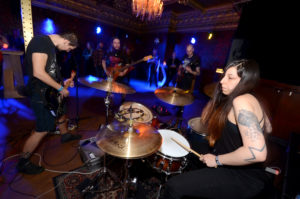
How did you choose your samples for the record? They do provide background and they are thought provoking. Was that your name intention? Is your library of such samples rich and still waiting to be used?
Bartek: Yes i have quite big collection of audio samples- from field recordings through instruments to documentaries. Over the years I developed some sort of habit of sample-hunting hehe. So most of time i watch or listen something i try to remember and then extract these parts which i find substantial or inspiring. I can say that i still haven’t used even considerable part of them but you know- everything has it’s time, sometimes you need to wait longer time to be able to put something in a particular context so it makes sense.
How do you “collect” the samples? Do you comb the internet or live with the button ready to be pressed when something worthy appears. Tell us about the habit of sample-hunting. Where do you store them and how do you manage such a huge collection, so you find the thing you are looking for?
Bartek: I use different methods- each one works best in different situations. When recording something from nature for instance, i usually use my phone with high quality microphone so the captured sound is as clean as possible. When watching movies or documentaries i often take notes of the time at which there is something worth saving and after that i extract these moments in video/audio editing program or through headphone output to another computer. I also have dedicated folder on my computer where i store my samples so finding them afterwards isn’t an issue 🙂
How did the deal with Argonauta Records come about?
Raquel: Once we got the album ready we contacted few favourite labels and Argonauta is one of them, their response was really positive and Gero is a really nice guy to work with, so we are really happy with them.
Ugliness and beauty. Do they come together in your music?
Greg: I feel like this question is similar to your first one about ‘light and darkness’ – another dualism, but nothing is ever really that simple. I think that in music playing around with dynamics is really important. For the most part the songs evolve and mutate from beginning to end and don’t always have your traditional structure. I see the songs as a form of movement not a simple opposition of beauty and ugliness. I find a lot of things that many think are ugly to be beautiful, so that’s a hard question to answer. I suppose we’re still a metal band and there is some ugliness, or ‘heaviness’, or whatever you want to call it, there as well. After all ‘what good is the warmth of summer, without the cold of winter to give it sweetness?’
Bartek: I think they do come together- it all depends what do you want to achieve, but of course it also depends on someone’s personal taste and perception. We wanted to show different shades of this world by using and abusing our gear in many ways. I think We didn’t want just to come together and play pissed off, dissonant, heavy as fuck music. Or be more “artistic”, add delays and reverbs to everything and play dreamy post-rock stuff 😉 I totally understand those who play just one style, be it heavy or light, fast or slow but our approach was just more undefined, experimental. Personally i feel that if we wanted our music to carry more stuff, to be more quiet, meditative at times but also angry, heavy or even monotonous we have to use different forms of expression. That is what I love in music- now when i’m writing these words i listen to Bohren and the Club Of Gore but tomorrow morning it may be Electric Wizard. So yes, you can use both beautiful harmonies as well as dissonant sounds but like Greg said- it all depends on the listener- what i personally see as ugliness can be seen by others as beauty, and vice versa.
Do you believe that people, nations across the globe will come together in the action of saving the planet from slow destruction?
Bartek: They say that hope dies last, isn’t it? That’s the thing i’m really struggling with, man. There’s no easy answer to this question, but i think that we should just do what we can, at least those who awoke(or are awaking) from this nightmare. We may succeed, we may fail- the trajectory of things don’t look too good at the moment but what else can we do? The success or failure depends on how many of us will put real effort to actually do something- i believe that after reaching a critical mass things would change much easier than some people think. The problems that people who really want be the change they want to see are still kind of pioneers, not understood by most of people. But on the other hand we can see how vegan movement is growing worldwide- we should keep pushing, keep promoting positive more sustainable, more compassionate lifestyles. When i’ll be on my deathbed i wanna know that at least i’ve been trying to be that change…
Greg: I think the collective experience is something that Nick Srnicek and Alex Williams talk about in their book Inventing the Future (which I would recommend to anyone reading). It’s a feeling of being overwhelmed. This generalised feeling of powerlessness is something that makes it difficult to even imagine ‘coming together’. Globalisation, international politics, climate change – these are all systems that shape our world. But their effects are so extensive and complicated that it is difficult to place our own experience within them.
Our struggles and futures are not confined to the borders of our respective nations. Some people want may want to hide away, put their heads in the sand and follow isolationist politics- like with Donald Trump in America, or the xenophobia that drove ‘Brexit’ in the UK. Trump’s ‘wall’ couldn’t be clearer in terms of this direction, not even a figurative but a literal barrier between peoples. But in reality It’s just a monolithic distraction from the fact that entire fucking system is falling apart. I feel like we’re living in some horrible waking nightmare at the moment. These politics have been encouraged by the total failure and collapse of neoliberalism. Yet the Right has really not come up with any alternative or any solution to the crisis that we’re faced with. They’re literally dragging the corpse of neoliberalism around like they’re in that film Weekend at Bernie’s or something. It’s up to us to build an alternative.
We’re faced with huge problems that can only be solved through concerted international efforts. I find it interesting how some environmentalists and other activists of the anarchist influenced type continue to fetishise localism as the end point and solution to humanity’s problems. We live in an increasingly complex, global society and there’s no return from that. We have to solve the world’s problems together and on a planetary level.
Earlier, you mentioned ‘going back to nature’ as being a goal of the band. I’m not really sure what that means? I think the band is partially about a respect for nature and the songs might relate to nature because nature is beautiful and precious. Nature reminds us of the value of what the earth and existence has to offer. I think an opportunity to commune with nature is actually essential to human happiness. So I suppose in that sense I would advocate a ‘return to nature’.
But, as a serious answer to your question, and maybe some of the band might disagree with me here; I’m not a primitivist, how can any serious person really be a primitivist? I think that new technologies and newer, more modern ways of living will actually have a huge part to play in the solutions to saving us from a slow destruction; both of the Earth and as happy and fulfilled human beings. Automation, and the common ownership of that which is automated, has the potential to achieve a post-work world! I want that! I want luxury and liberation from the drudgery of doing some bullshit job.
Unless we see a drastic drop in the human population how can people ‘go back to nature’? More than half of the world’s 7.5 billion people live in cities – which is only going to increase. There could an extra 2.5 billion people living in cities by 2050. So, unless we start culling people there is no ‘going back to nature’ in the primitivist sense. No, we should respect nature and expand our immense capacities as human beings and look to expand the commons. By the ‘commons’ I mean that the city as well as the land which need to be managed as a shared resource that belongs equally to all of its inhabitants. We need new cities and new technologies, including agricultural technologies, that both solve our problems as human beings and don’t harm the earth at the same time.
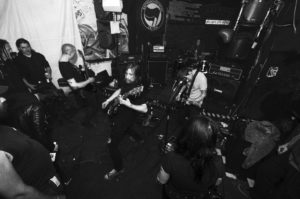
How often do you gig and what are the plans for 2017 when it comes to touring?
Raquel: We don’t gig often, but 2017 looks like is gonna be a busy year for us. We have a few gigs planned in London and an Euro Tour with CALLIGRAM in August so far.
Any chances for the vocals?
Greg: Bartek is already doing a solid job on the vocals front.
Raquel: We recently started adding vocals to our new material. After all this time making instrumental music I couldn’t picture Sūrya with vocals, but as Greg said Bartek is doing a great job, his style fits perfectly with the music.
What is round the corner for SURYA? More records, any changes to your style?
Greg: It’s inevitable that the band’s style will evolve and change especially since I’m a new element that has been introduced to the mix. We all have our own individual influences and interests. At the moment the new material we’ve been working on features some faster parts, which is a bit of a change. We haven’t planned how the songs will sound. They evolve organically, so you’ll have to wait and see.
Raquel: Apart of the Euro Tour and gigs we mentioned before we are focusing on writing new material, hopefully we will be ready to get into the studio to record again by the end of the year.
Also “Apocalypse A.D.” will be released on vinyl pretty soon and it will be available through these awesome labels/distros: Up The Punx, Atman, DIY Koło, Stradoom and Argonauta 🙂
So who are the individuals behind this heavy, gloomy and depressive collection of beautiful sounds?
Mark: I play bass guitar
Greg: I play guitar. I recently took over from Rafał who played guitar on the band’s previous recordings.
Bartek: I play guitar, sampler and occasionally do vocals.
Raquel: I play drums
